(完整word)初中反身代词讲解及练习
- 格式:doc
- 大小:51.06 KB
- 文档页数:4
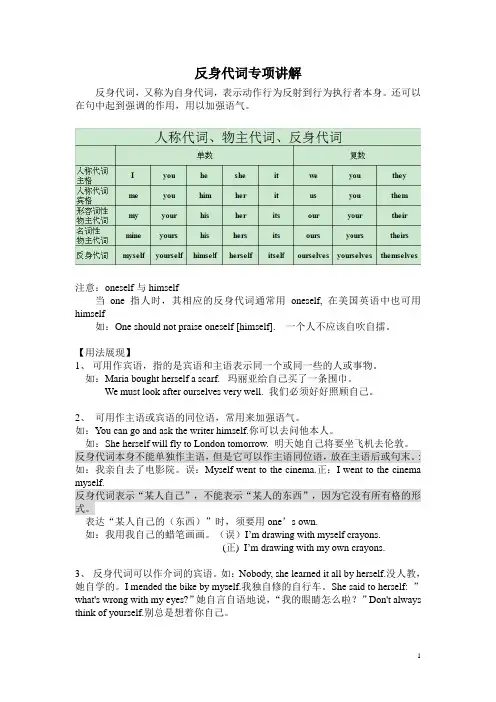
反身代词专项讲解反身代词,又称为自身代词,表示动作行为反射到行为执行者本身。
还可以在句中起到强调的作用,用以加强语气。
注意:oneself与himself当one指人时,其相应的反身代词通常用oneself, 在美国英语中也可用himself如:One should not praise oneself [himself]. 一个人不应该自吹自擂。
【用法展现】1、可用作宾语,指的是宾语和主语表示同一个或同一些的人或事物。
如:Maria bought herself a scarf. 玛丽亚给自己买了一条围巾。
We must look after ourselves very well. 我们必须好好照顾自己。
2、可用作主语或宾语的同位语,常用来加强语气。
如:You can go and ask the writer himself.你可以去问他本人。
如:She herself will fly to London tomorrow. 明天她自己将要坐飞机去伦敦。
反身代词本身不能单独作主语,但是它可以作主语同位语,放在主语后或句末。
:如:我亲自去了电影院。
误:Myself went to the cinema.正:I went to the cinema myself.反身代词表示“某人自己”,不能表示“某人的东西”,因为它没有所有格的形式。
表达“某人自己的(东西)”时,须要用one’s own.如:我用我自己的蜡笔画画。
(误)I’m drawing with myself crayons.(正) I’m drawing with my own crayons.3、反身代词可以作介词的宾语。
如:Nobody, she learned it all by herself.没人教,她自学的。
I mended the bike by myself.我独自修的自行车。
She said to herself: ”what's wrong with my eyes?”她自言自语地说,“我的眼睛怎么啦?”Don't always think of yourself.别总是想着你自己。
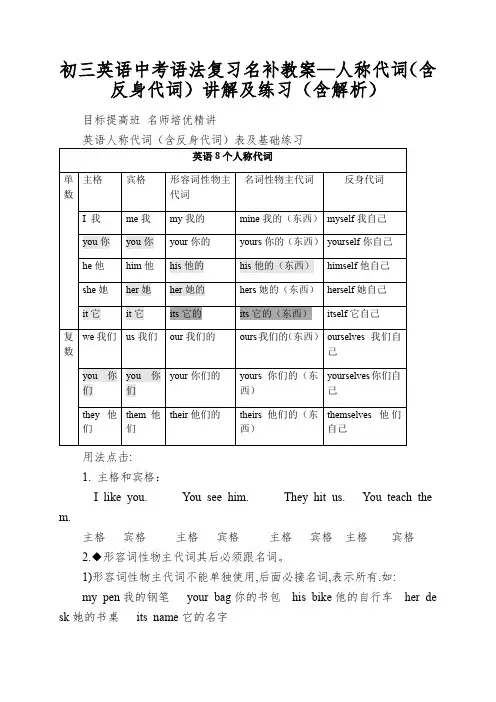
初三英语中考语法复习名补教案—人称代词(含反身代词)讲解及练习(含解析)目标提高班名师培优精讲英语人称代词(含反身代词)表及基础练习用法点击:1. 主格和宾格:I like you. You see him. They hit us. You teach the m.主格宾格主格宾格主格宾格主格宾格2.◆形容词性物主代词其后必须跟名词。
1)形容词性物主代词不能单独使用,后面必接名词,表示所有.如:my pen我的钢笔your bag你的书包his bike他的自行车her de sk她的书桌its name它的名字例句:Is that your bike? 那是你的自行车吗?Those are our books. 那些是我们的书。
◆假如名词前有形容词性物主代词,就不能同时用冠词(a, an, the)或指示代词(this, that, these, those)修饰此名词。
[正]This is my pencil. [误]This is my a pencil.[正]This is a pencil. [误] This is a my pencil.◆形容词性物主代词与形容词一起修饰名词时,要放在形容词之前。
如:his English books 他的英语书their Chinese friends 他们的中国朋友形容词性物主代词与名词性物主代词之间的关系为:名词性物主代词=相应的形容词性物主代词+名词例如:Your bedroom(=yours) is big.Mine (=My bedroom) is big, too. 你的卧房大。
我的卧房也大。
注意:在使用名词性物主代词时,必须有特定的语言环境,也确实是要省略的名词大伙儿差不多明白,差不多提起过。
例:It’s hers. 是她的。
(单独使用大伙儿不知是如何回事,不能够如此用)There is a book. It’s hers. 那有本书。
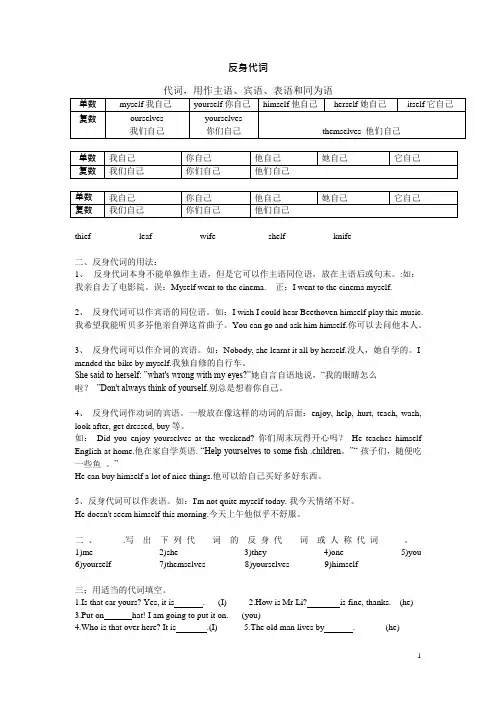
反身代词thief leaf wife shelf knife二、反身代词的用法:1、反身代词本身不能单独作主语,但是它可以作主语同位语,放在主语后或句末。
:如:我亲自去了电影院。
误:Myself went to the cinema. 正:I went to the cinema myself.2、反身代词可以作宾语的同位语。
如:I wish I could hear Beethoven himself play this music. 我希望我能听贝多芬他亲自弹这首曲子。
You can go and ask him himself.你可以去问他本人。
3、反身代词可以作介词的宾语。
如:Nobody, she learnt it all by herself.没人,她自学的。
I mended the bike by myself.我独自修的自行车。
She said to herself: ”what's wrong with my eyes?”她自言自语地说,“我的眼睛怎么啦?”Don't always think of yourself.别总是想着你自己。
4、反身代词作动词的宾语。
一般放在像这样的动词的后面:enjoy, help, hurt, teach, wash, look after, get dressed, buy 等。
如:Did you enjoy yourselves at the weekend? 你们周末玩得开心吗?He teaches himself English at home.他在家自学英语. “Help yourselves to some fish .children。
”“ 孩子们,随便吃一些鱼。
”He can buy himself a lot of nice things.他可以给自己买好多好东西。
5、反身代词可以作表语。
如:I'm not quite myself today. 我今天情绪不好。
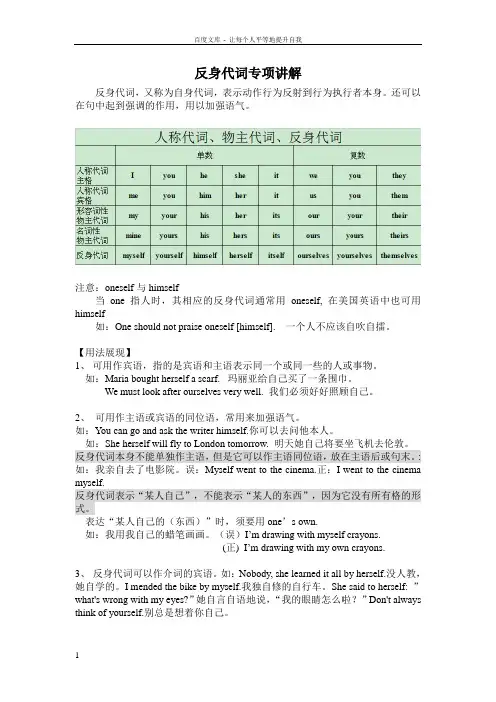
反身代词专项讲解反身代词,又称为自身代词,表示动作行为反射到行为执行者本身。
还可以在句中起到强调的作用,用以加强语气。
注意:oneself与himself当one指人时,其相应的反身代词通常用oneself, 在美国英语中也可用himself如:One should not praise oneself [himself]. 一个人不应该自吹自擂。
【用法展现】1、可用作宾语,指的是宾语和主语表示同一个或同一些的人或事物。
如:Maria bought herself a scarf. 玛丽亚给自己买了一条围巾。
We must look after ourselves very well. 我们必须好好照顾自己。
2、可用作主语或宾语的同位语,常用来加强语气。
如:You can go and ask the writer himself.你可以去问他本人。
如:She herself will fly to London tomorrow. 明天她自己将要坐飞机去伦敦。
反身代词本身不能单独作主语,但是它可以作主语同位语,放在主语后或句末。
:如:我亲自去了电影院。
误:Myself went to the cinema.正:I went to the cinema myself.反身代词表示“某人自己”,不能表示“某人的东西”,因为它没有所有格的形式。
表达“某人自己的(东西)”时,须要用one’s own.如:我用我自己的蜡笔画画。
(误)I’m drawing with myself crayons.(正) I’m drawing with my own crayons.3、反身代词可以作介词的宾语。
如:Nobody, she learned it all by herself.没人教,她自学的。
I mended the bike by myself.我独自修的自行车。
She said to herself: ”what's wrong with my eyes?”她自言自语地说,“我的眼睛怎么啦?”Don't always think of yourself.别总是想着你自己。
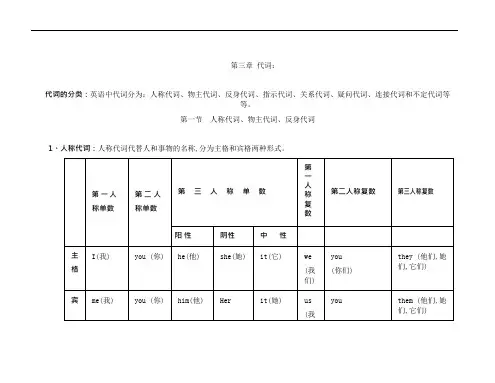
第三章代词:代词的分类:英语中代词分为:人称代词、物主代词、反身代词、指示代词、关系代词、疑问代词、连接代词和不定代词等等。
第一节人称代词、物主代词、反身代词1、人称代词:人称代词代替人和事物的名称,分为主格和宾格两种形式。
(1)、主格用来作句子的主语、表语。
如:I o f t e n go s h opp i n g o n S un d a y s.(星期天我常去购物) /A r e t h e y f r o mB r a z il?(他们是巴西人吗?) /W h e r e h a v e t h e y go n e?(他们上哪儿去了?) /T h a t’s i t.(就那么回事) /It’she!(是他!)(2)、宾格用来作及物动词或者介词的宾语。
如:W h o t e a c h e s y o u E n g li s h t h i s y e a r?(今年谁教你们的英语?) /H e l p m e!(救救我!) /W e o f t e n w r i t e l e tt e r s t o h e r.(我们常给他写信)(3)、人称代词作表语或者放在比较状语从句连词 than 或as 之后时,可以用主格形式,也可以用宾格形式,口语中大多用宾格。
如:--W h o i s i t?(是谁?) –I t’s I/m e.(是我。
)(4)、三个不同人称同时出现,或者主语中包含“我”时,按照“you→he→I”的顺序表达。
如:Bo t h h e a n d I a r e w o r k i n g a t t h a t c o m p u t e r c o m p a n y.(我和他都在那家电脑公司上班) –W h o w ill go t h e r e?(谁要去那儿?) –You and me.(你和我)(5)、人称代词it 除了可以指人指物之外,还可以表示“时间、天气、温度、距离、情况”等含义,此外还可以作“非人称代词” 使用,替代作主语或者宾语的不定式、动名词或者名词性从句。
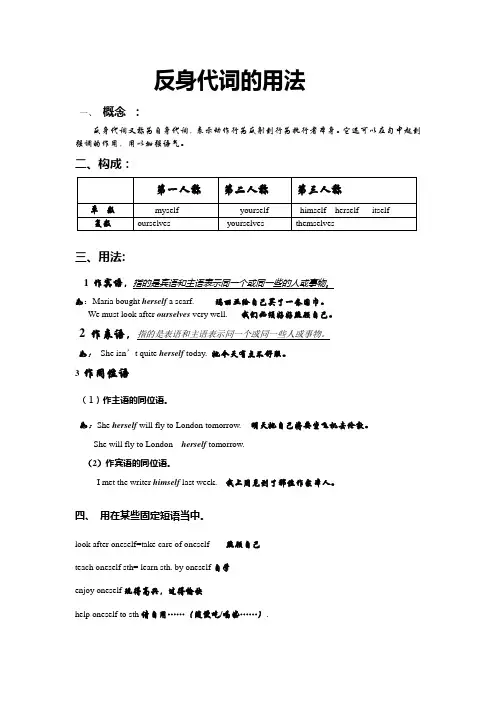
反身代词的用法一、概念:反身代词又称为自身代词,表示动作行为反射到行为执行者本身。
它还可以在句中起到强调的作用,用以加强语气。
二、构成:第一人称第二人称第三人称单数myself yourself himself herself itself复数ourselves yourselves themselves三、用法:1 作宾语,指的是宾语和主语表示同一个或同一些的人或事物。
如:Maria bought herself a scarf. 玛丽亚给自己买了一条围巾。
We must look after ourselves very well. 我们必须好好照顾自己。
2 作表语,指的是表语和主语表示同一个或同一些人或事物。
如:She isn’t quite herself today. 她今天有点不舒服。
3 作同位语(1)作主语的同位语。
如:She herself will fly to London tomorrow. 明天她自己将要坐飞机去伦敦。
She will fly to London herself tomorrow.(2)作宾语的同位语。
I met the writer himself last week. 我上周见到了那位作家本人。
四、用在某些固定短语当中。
look after oneself=take care of oneself 照顾自己teach oneself sth= learn sth. by oneself自学enjoy oneself玩得高兴,过得愉快help oneself to sth请自用……(随便吃/喝些……).hurt oneself摔伤自己say to oneself自言自语lose oneself in 沉浸于,陶醉于……之中leave sb. by oneself把某人单独留下buy oneself sth.给自己买……东西introduce oneself 介绍……自己温馨提醒:1 反身代词不能单独做主语,但可以做主语的同位语,起强调作用。
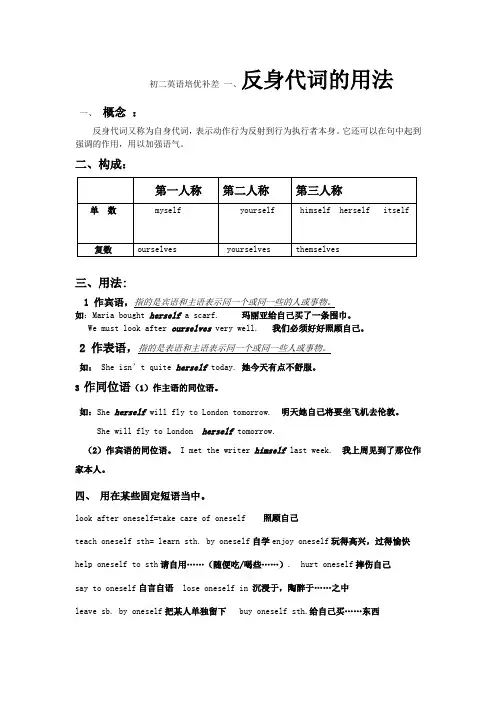
初二英语培优补差一、反身代词的用法一、概念:反身代词又称为自身代词,表示动作行为反射到行为执行者本身。
它还可以在句中起到强调的作用,用以加强语气。
二、构成:三、用法:1 作宾语,指的是宾语和主语表示同一个或同一些的人或事物。
如:Maria bought herself a scarf. 玛丽亚给自己买了一条围巾。
We must look after ourselves very well. 我们必须好好照顾自己。
2 作表语,指的是表语和主语表示同一个或同一些人或事物。
如: She isn’t quite herself today. 她今天有点不舒服。
3 作同位语(1)作主语的同位语。
如:She herself will fly to London tomorrow. 明天她自己将要坐飞机去伦敦。
She will fly to London herself tomorrow.(2)作宾语的同位语。
I met the writer himself last week. 我上周见到了那位作家本人。
四、用在某些固定短语当中。
look after oneself=take care of oneself 照顾自己teach oneself sth= learn sth. by oneself自学enjoy oneself玩得高兴,过得愉快help oneself to sth请自用……(随便吃/喝些……). hurt oneself摔伤自己say to oneself自言自语lose oneself in 沉浸于,陶醉于……之中leave sb. by oneself把某人单独留下 buy oneself sth.给自己买……东西introduce oneself 介绍……自己温馨提醒 :1 反身代词不能单独做主语,但可以做主语的同位语,起强调作用。
如:我自己能完成作业。
(误)Myself can finish my homework..(正) I myself can finish my homework.2 反身代词表示“某人自己”,不能表示“某人的东西”,因为它没有所有格的形式。

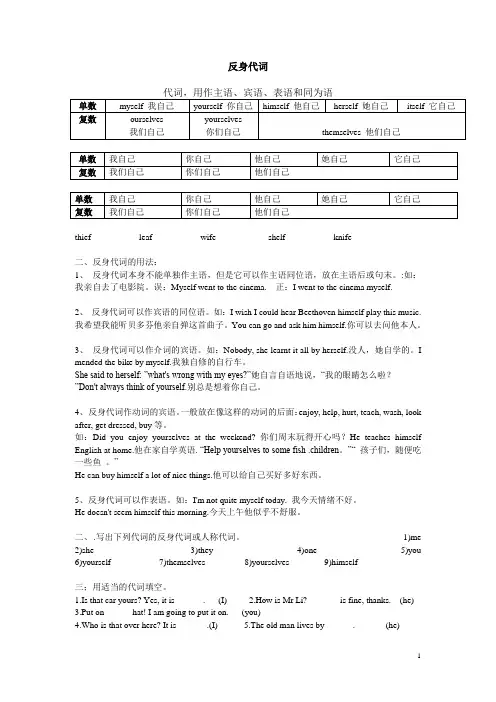
反身代词thief leaf wife shelf knife二、反身代词的用法:1、反身代词本身不能单独作主语,但是它可以作主语同位语,放在主语后或句末。
:如:我亲自去了电影院。
误:Myself went to the cinema. 正:I went to the cinema myself.2、反身代词可以作宾语的同位语。
如:I wish I could hear Beethoven himself play this music.我希望我能听贝多芬他亲自弹这首曲子。
You can go and ask him himself.你可以去问他本人。
3、反身代词可以作介词的宾语。
如:Nobody, she learnt it all by herself.没人,她自学的。
I mended the bike by myself.我独自修的自行车。
She said to herself: ”what's wrong with my eyes?”她自言自语地说,“我的眼睛怎么啦?”Don't always think of yourself.别总是想着你自己。
4、反身代词作动词的宾语。
一般放在像这样的动词的后面:enjoy, help, hurt, teach, wash, look after, get dressed, buy等。
如:Did you enjoy yourselves at the weekend? 你们周末玩得开心吗?He teaches himself English at home.他在家自学英语. “Help yourselves to some fish .children。
”“ 孩子们,随便吃一些鱼。
”He can buy himself a lot of nice things.他可以给自己买好多好东西。
5、反身代词可以作表语。
如:I'm not quite myself today. 我今天情绪不好。
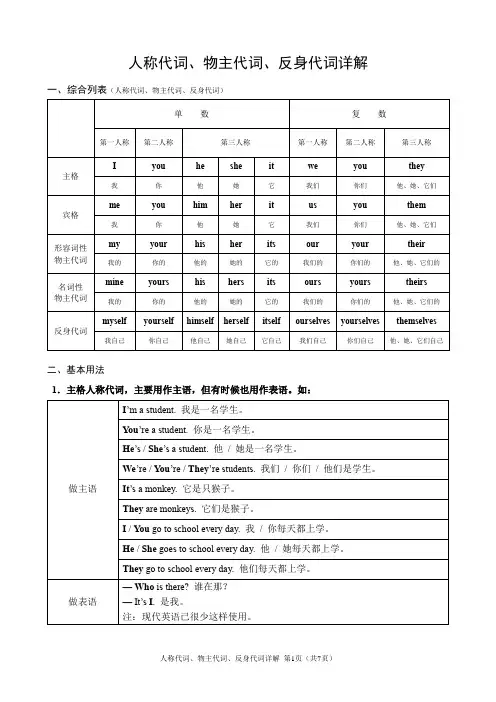
人称代词、物主代词、反身代词详解一、综合列表(人称代词、物主代词、反身代词)二、基本用法1.主格人称代词,主要用作主语,但有时候也用作表语。
如:2.宾格人称代词主要用作宾语和表语。
如:3.形容词性物主代词做定语,起修饰作用。
如:4.名词性物主代词相当于名词,既代替事物又表明所属关系,在句子中往往独立地作主语、宾语或者表语,后面不再跟名词。
5.反身代词,句子中可以做宾语、表语、同位语等,但不能做主语。
6.三个不同人称同时出现,或者主语中包含“我”时,按照“you→he→I”的顺序表达。
Both he and I are working at that computer company.人称代词、物主代词、反身代词测试题一、用所给代词的正确形式填空。
1.These are __________ (he) books.2.That is __________ (she) sister.3.Lily is __________ (Lucy) sister.4.Tom, this is __________ (me) cousin, Mary.5.Now __________ (her parent) are in America.6.Those children are __________ (I) father’s students.7.Do you know __________ (it) name?8.Mike and Tom __________ (be) friends.9.Thanks for helping ________(I).10.__________ (Ann) mother is __________ (we) teacher.11.__________is my aunt.We often visit __________ (she)12.China is a developing country._________is in the east of Asia. (its)13.I own a blue bike.The red one isn’t __________. (I)14.These new houses are so nice.__________ are very expensive. (them)15.The fishermen caught a lot of fish,didn’t__________? (them)16.Ling Ling is a girl.__________ studies in a primary school.__________ brother lives with __________ and often helps__________ with__________ lessons. (she)17.Mike is my classmate.__________ is good at English. (his)18.Kate wants a glass of milk.Will you pass it to__________? (she)19.What’s the weather like today?__________ is cloudy. (its)20.— I ate up all__________ sandwiches yesterday. (I)— Can I have one of__________? (you)21.George has lost__________ (his)pen.Ask Mary if she can lend him__________. (she) 22.Jack has a dog and so have I.__________ (he) dog and__________ (I)had a fight. 23.The teacher wants you to return that book of__________ (he)24.Mr.and Mrs.Green and a friend of__________are coming to see us. (they)25.We are going to Paris to stay with a French friend of__________. (we)二、用适当的人称代词和物主代词填空A.从括号内选择正确的代词填空26.Your football clothes are on the desk. Please put_________ (they, them, their, theirs)away. 27.(We, Us, Our, Ours) _________English teacher is Mrs.Green. We all like_________ (she, her, hers).28.(I, Me, My, Mine) _________can’t get my kite.Could you help_________ (I, me, my, mine)? 29.Tom can’t get down from the tree. Can you help_________ (he, him, his)?30.These are_________ (he, him, his)model planes. Those are_________ (I, me, mine).B.填入正确的人称代词和物主代词31.This isn’t ________ knife._________is green. (she)32.These are your books,Kate.Put__________in the desk, please. (they)33._________ must look after_________ things. (you)34.Wei Fang, is that_________ ruler?Yes, it’s. (you)35.They want a football.Give_________ the green one,please. ( they)36.It’s Lin Tao’s bag.Give it to__________. (he)37.Is this pencil-box Li Lei’s?No,___________is very new. (he)38.This box is too heavy.I can’t carry_________.(it)Don’t worry, Let__________ (I)help__________. (you)39._________ is a boy and_________ name is Mike.Mike’s friends like_________ very much.(he)40.My sister is in_________ room._________is a teacher. (she)三、选择填空41.— Who’s singing over there?—________is Sandy’s sister.A.ThatB.ItC.SheD.This42.________will spend the summer holiday in Hawaii.A.She,you and IB.You,she and IC.I,you and sheD.Her,me and you43.My uncle bought a new bike for________.A.theirsB.theyC.meD.I44.— Here’s a postcard for you,Jim!—Oh,________is from my friend,Mary.A.heB.itC.sheD.it’s 45.Little Baby knows that he should not take the things that do not belong to __________.A.heB.hisC.herD.him 46.— Is she your aunt?— Yes, __________.A. she’sB. her isC. she isD. he is 47.— Are __________ coats yours?— Yes, they are.A. theyB. theseC. thisD. there 48.— Is that __________ uncle?— No, it isn’tA. heB. sheC. herD. hers 49.— Will anyone go on a trip with him?—Not__________.A.IB.meC.mineD.he 50.Among those lovely toys,the brown toy dog was given by__________.A.heB.hisC.himD.he’s 51.— I saw grandma shop online. Who taught ________ that?— Nobody. She learned it by _________.A. she; herB. her; herC. her; herselfD. herself; her 52.On the way to Lijiang, the scenery was so beautiful that all of us lost ______ in it.A. myselfB. themselvesC. ourselvesD. yourselves 53.— Did anyone call me when I was out?— Yes. A man who called _________ Tom.A. myselfB. himselfC. herselfD. yourself 54.— What a nice model plane!— Thanks. I made it with 3-D printer by _________.A. meB. himC. itselfD. myself55.Dad, don’t worry about me. I can look after _________.A. myselfB. herselfC. himselfD. yourself 56.— Huang Wei rides a bike very well. Who taught him?— No one. He taught _________.A. himB. heC. hisD. himself 57.— Can you make _________ understood in English?— Yes, I can.A. yourselfB. youC. yoursD. your 58.— Judy and I will go to the beach tomorrow.— It s so nice. Enjoy _________.A. yourselvesB. yourselfC. herselfD. ourselves 59.My brother is old enough to dress _________ now.A. herselfB. himselfC. myselfD. yourself 60.— I’ll have a tennis game tomorrow. I m a little bit nervous.— Believe in _________. You’re the best in our club.A. herselfB. myselfC. yourselfD. himself四、改错题61.Andrew and myself will conduct today’s meeting.62.Myself will conduct today’s meeting.63.You may submit your expenses to Mr. Martin or myself before Friday.测试题参考答案1.his2.her3.Lucy’s4.my5.her parents 6.my 7.its8.are9.me10.Ann’s; our 11.She; her12.It is13.mine14.They15.they 16.She; Her;17.He18.her19.It is20.my; yours He; her; her21.his; hers22.His; mine23.His24.theirs25.ours 26.them27.Our; her28.I; me29.him30.his; mine 31.her; hers32.them33.You; your34.your35.them 36.him37.his38.it; me; you39.He; his; him40.her; She 41.B42.B43.C44.B45.D46.C47.B48.C49.A50.C51.C52.C53.B54.D55.A56.D57.A58.A59.B60.C 61.Andrew and myself will conduct today’s meeting.Andrew and I will conduct today’s meeting.62.Myself will conduct today’s meeting.I will conduct today’s meeting.63.You may submit your expenses to Mr. Martin or myself before Friday.You may submit your expenses to Mr. Martin or me before Friday.。
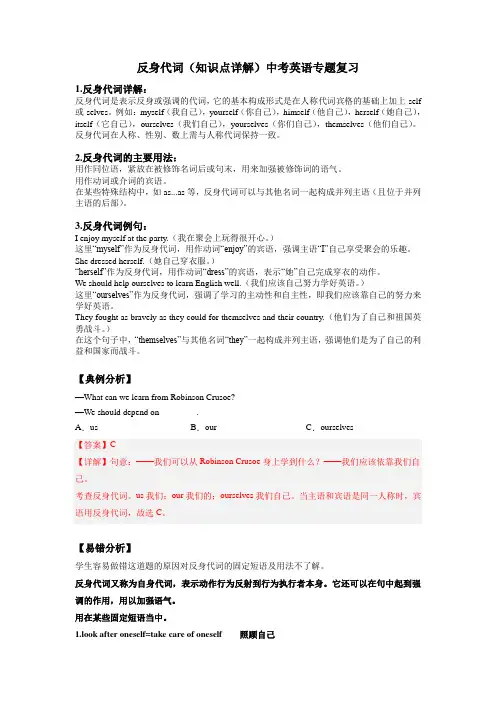
反身代词(知识点详解)中考英语专题复习1.反身代词详解:反身代词是表示反身或强调的代词,它的基本构成形式是在人称代词宾格的基础上加上-self 或-selves。
例如:myself(我自己),yourself(你自己),himself(他自己),herself(她自己),itself(它自己),ourselves(我们自己),yourselves(你们自己),themselves(他们自己)。
反身代词在人称、性别、数上需与人称代词保持一致。
2.反身代词的主要用法:用作同位语,紧放在被修饰名词后或句末,用来加强被修饰词的语气。
用作动词或介词的宾语。
在某些特殊结构中,如as...as等,反身代词可以与其他名词一起构成并列主语(且位于并列主语的后部)。
3.反身代词例句:I enjoy myself at the party.(我在聚会上玩得很开心。
)这里“myself”作为反身代词,用作动词“enjoy”的宾语,强调主语“I”自己享受聚会的乐趣。
She dressed herself.(她自己穿衣服。
)“herself”作为反身代词,用作动词“dress”的宾语,表示“她”自己完成穿衣的动作。
We should help ourselves to learn English well.(我们应该自己努力学好英语。
)这里“ourselves”作为反身代词,强调了学习的主动性和自主性,即我们应该靠自己的努力来学好英语。
They fought as bravely as they could for themselves and their country.(他们为了自己和祖国英勇战斗。
)在这个句子中,“themselves”与其他名词“they”一起构成并列主语,强调他们是为了自己的利益和国家而战斗。
【典例分析】—What can we learn from Robinson Crusoe?—We should depend on ________.A.us B.our C.ourselves【答案】C【详解】句意:——我们可以从Robinson Crusoe身上学到什么?——我们应该依靠我们自己。
2022年九年级英语中考语法讲解和练习反身代词反身代词是一种表示反射或强调的代词。
它的基本含义是:通过反身代词指代主语,使施动者把动作在形式上反射到施动者自己。
因此,反身代词与它所指代的名词或代词形成互指关系,在人称、性质、数上保持一致。
比如:我自己、你自己、他自己、我们自己等等。
这就是反身代词。
表示反射或强调的代词叫做反身代词。
反身代词是由第一人称、第二人称形容词性物主代词或第三人称人称代词宾格形式,词尾加self或selves组成。
反身代词可译为“本人”、“本身”,为加强语气,也常译为“亲自”、“自己”。
反身代词的构成1、第一、二人称的反身代词是由形容词性物主代词加上-self或-selves(selves-是当形容词性物主代词为复数时才用的)构成的。
如:I--myself we--ourselves you(单数)-- yourself you(复数)-- yourselves2、第三人称的反身代词是由人称代词的宾格加上-self或-selves(selves-是当形容词性物主代词为复数时才用的)构成的。
如:she--herself he --himself it--itselfthey--themselves one--oneself一、反身代词的基本形式反身代词是oneself根据所指词的人称、性别、单复数等的变化可以有myself, himself, herself, yourself, itself, ourselves, yourselves, themselves 等形式。
二、oneself与himself当one指人时,其相应的反身代词通常用oneself, 在美国英语中也可用himself:One should not praise oneself [himself]. 一个人不应该自吹自擂。
三、反身代词的句法功能:1. 用作同位语(加强被修饰词的语气,紧放在被修饰名词后, 或句末):The box itself is not so heavy. 箱子本身并不重。
中学英语语法专项练习---反身代词大全(附详细解析)On the way to Mount Heng, the scenery was so beautiful that all of us lost ______ in it.A. myselfB. themselvesC. ourselves【答案】C【解析】试题分析:句意:在去衡山的路上,风景是如此的美,以致于我们都被迷在其中了。
A. myself 我自己;B. themselves他们自己;C. ourselves我们自己。
风景迷人,我们把我们自己沉迷其中了。
故选C。
考点:考查反身代词辨析。
—- Jim, please help ______ to some bread .—- Thank you.A. himself .B. yourself .C. herselfD. myself.【答案】B【解析】试题分析:himself 是“他自己”,yourself 是“你自己”,herself 是“她自己”,myself 是“我自己”。
help yourself ( 或yourselves ) 是固定短语,“(请你、你们)随便吃”,根据句意“请随便吃一些面包”,所以选B 。
考点;考查反身代词的用法。
Boys, don’t lose ______ in playing Angry Birds. It is bad for your eyes to play computer games for a long time.A. himselfB. yourselfC. themselvesD. yourselves【答案】D【解析】试题分析:himself他自己;yourself你自己;themselves他们自己;yourselves你们自己。
句意:孩子们,不要让你们自己迷失在愤怒的小鸟游戏中。
长时间玩电脑游戏对你们的眼睛不好。
结合语境可知下文反身代词指代前文提到的boys,故用复数形式,选D。
第二课时英语人称代词和物主代词一、人称代词表示“我"、“你”、“他”、“她”、“它”、“我们"、“你们”、“他们”的词,叫做人称代词.人称代词有人称、数和格的变化,见下表:I am a teacher. You are student. He is a student,too.We/You/They are students。
2.人称代词宾格作宾语,表示动作行为的对象.Give it to me。
Let’s go (let’s =let us)3.单数人称代词并列作主语时,其顺序为:第二人称、第三人称、第一人称;复数人称代词并列作主语时,其顺序为:第一人称、第二人称、第三人称二、物主代词表示所有关系的代词叫做物主代词,也可叫做代词所有格。
物主代词分形容词性物主代词和名词性物主代词二种,其人称和数的变化见下表。
1.形容词性物主代词(my/your/his/her/its/our/their)+名词(相当于形容词)形容词性物主代词不能单独使用Is this your book? No,,it isn’t,it’s hers(her book)2。
而名词性物主代词则相当于形容词性物主代词+名词,故其后不必加名词。
如:This pen is mine.反身代词1.含义反身代词用于指代某人或某物自己。
第一人称和第二人称的反身代词由形容词性物主代词+self/selves"构成;第三人称反身代词由人称代词的宾格+self/selves”构成。
2.用法:1、反身代词的句法功能:反身代词在句中主要用作宾语(用在动词和介词后)和同位语(通常放在主语后面或者句末):He taught himself English。
他自学英语.She is too young to look after herself。
她年纪太小,不能照顾自己。
He himself was a doctor。
他本人就是一位医生。
初三英语中考语法复习名补教案—人称代词(含反身代词)讲解及练习(含答案)初三英语总复习补习班名补教案目标提高班名师培优精讲英语人称代词(含反身代词)表及基础练习英语8个人称代词单数主格宾格形容词性物主代词名词性物主代词反身代词I 我me我my我的mine我的(东西)myself我自己you你you你your你的yours你的(东西)yourself你自己he他him他his他的his他的(东西)himself他自己she她her她her她的hers她的(东西)herself她自己it它it它its它的its它的(东西)itself它自己复数we我们us我们our我们的ours我们的(东西)ourselves我们自己you你们you你们your你们的yours你们的(东西)yourselves你们自己they他们them他们their他们的theirs他们的(东西)themselves他们自己1. 主格和宾格:I like you. You see him. They hit us. You teach them.主格宾格主格宾格主格宾格主格宾格2.◆形容词性物主代词其后必须跟名词。
1)形容词性物主代词不能单独使用,后面必接名词,表示所有.如:•my pen我的钢笔your bag你的书包his bike他的自行车her desk 她的书桌its name它的名字例句:Is that your bike? 那是你的自行车吗?Those are our books. 那些是我们的书。
◆如果名词前有形容词性物主代词,就不能同时用冠词(a, an, the)或指示代词(this, that, these, those)修饰此名词。
•[正]This is my pencil. [误]This is my a pencil.(1)We must finish it all by ourselves.(我们必须全靠自己去完成。
反身代词专项讲解反身代词,又称为自身代词,表示动作行为反射到行为执行者本身。
还可以在句中起到强调的作用,用以加强语气。
注意:oneself与himself当one指人时,其相应的反身代词通常用oneself, 在美国英语中也可用himself如:One should not praise oneself [himself]. 一个人不应该自吹自擂。
【用法展现】1、可用作宾语,指的是宾语和主语表示同一个或同一些的人或事物。
如:Maria bought herself a scarf. 玛丽亚给自己买了一条围巾。
We must look after ourselves very well. 我们必须好好照顾自己。
2、可用作主语或宾语的同位语,常用来加强语气。
如:You can go and ask the writer himself.你可以去问他本人。
如:She herself will fly to London tomorrow. 明天她自己将要坐飞机去伦敦。
反身代词本身不能单独作主语,但是它可以作主语同位语,放在主语后或句末。
:如:我亲自去了电影院。
误:Myself went to the cinema.正:I went to the cinema myself.反身代词表示“某人自己”,不能表示“某人的东西”,因为它没有所有格的形式。
表达“某人自己的(东西)”时,须要用one’s own.如:我用我自己的蜡笔画画。
(误)I’m drawing with myself crayons.(正) I’m drawing with my own crayons.3、反身代词可以作介词的宾语。
如:Nobody, she learned it all by herself.没人教,她自学的。
I mended the bike by myself.我独自修的自行车。
She said to herself: ”what's wrong with my eyes?”她自言自语地说,“我的眼睛怎么啦?”Don't always think of yourself.别总是想着你自己。
4、反身代词作动词的宾语。
一般放在像这样的动词的后面:enjoy, help, hurt, teach, wash, look after, get dressed, buy等。
如:Did you enjoy yourselves at the weekend? 你们周末玩得开心吗?He teaches himself English at home.他在家自学英语. “Help yourselves to some fish .children。
”“孩子们,随便吃一些鱼。
”He can buy himself a lot of nice things.他可以给自己买好多好东西。
5、可用作表语,指的是表语和主语表示同一个或同一些人或事物。
如:I'm not quite myself today. 我今天情绪不好。
He doesn't seem himself this morning.今天上午他似乎不舒服。
【说明】有时用于be, feel, seem, look 等后作表语表示身体或精神处于正常状态:I’m not quite myself these days. 我近来身体不大舒服。
I’ll be myself again in no time. 我过一会儿就会好的。
6、用在某些固定短语当中与典型介词搭配,构成固定短语,表达特定含义。
1) (all) by oneself 单独地When I was young, I had to make a living all by myself.Would you go there by yourself?2) to oneself 独自享用When he eats in a restaurant, he likes a table to himself.3) for oneself 为自己;独自One shouldn’t live for himself alone.You must find it out for yourself.4) of oneself自动地The door opened of itself.5) between ourselves私下里Just between ourselves, I don’t think much of him.6) in oneself本身The materials in themselves were not poisonous.7)beside oneself喜怒时发狂She was beside herself with joy.8) by itself自然地The machine will start by itself in a few seconds.3. 与典型动词搭配,构成固定短语。
1) be not oneself身体不好2)enjoy oneself玩得很痛快3)help oneself to sth. 随便吃Please help yourself to some fish.4) teach oneself sth.自学/ learn sth. by oneself自学When he was young, he taught himself advanced mathematics.5) accustom oneself to 习惯于He quickly accustomed himself to this new way of life.6) devote oneself to致力于I am determined to devote myself to the cause of education.7) adapt oneself to适应She quickly adapted herself to the new climate.8) adjust oneself to调整;适应The body quickly adjusts itself to changes in temperature.9)behave oneself举止得体Please behave yourselves.10) dress oneself穿衣服He is too young to dress himself.11) seat oneself就坐He seated himself in the chair and began to read the novel.12) make oneself heard / understood / seen / known / believed让自己被(别人)听见/听懂/看见/认识/相信He raised his voice to make himself heard by all.13) find oneself无意识中发现自己At last, we found ourselves in a pleasant park with trees providing shade. 14) express oneself清楚表达自己的意思He is still unable to express himself in English.15) talk to oneself自言自语16) come to oneself 苏醒17) look after oneself / take care of oneself 照顾自己hurt oneself摔伤自己say to oneself自言自语lose oneself in 沉浸于,陶醉于……之中leave sb. by oneself把某人单独留下buy oneself sth.给自己买……东西introduce oneself 介绍……自己反身代词练习题一.选择。
1. Those girls enjoyed ____ in the party last night.A. themB. theyC. themselvesD. herself2. Help ____ to some fish, children.A. yourselfB. yourC. yoursD. yourselves3. The film ____ is very fun.A. it’sB. itselfC. itD. its4. –Who teaches ____ math? –I teach ______.A. your, myselfB. you, myselfC. you, meD. you, herself5. The father will make ____ a bike ____.A. her, himselfB. she, himselfC. her, herselfD. she, herself6. The scarf is ____, she made it_____.A. herself, herB. herself, hersC. hers, herselfD. her, herself7. Liu Hulan’s death was great. She thought more of others than ______. A. herB. sheC. hersD. herself8. Luckily, he didn’t hurt ____ terribly yesterday.A. himB. themselvesC. himselfD. they9. I can’t mend my shoe _____. Can you mend it for ?A. myself, meB. myself, IC. me, ID. I, me10. I like watching in the mirror.A. meB. IC. myD. Myself11. Hi, Judy. — Hi, Jason. Come in. Make ________ at home.A. yourselfB. usC. yourselvesD. you12. Mum often war ns the boy ________ swim ________ in the sea because it’sdangerous.A. don’t, aloneB. not, by himselfC. not to, by himselfD. not to, lonely13. Li Lei and Lin Tao are working harder than before to improve ________.A. themselvesB. himselfC. theirD. theirs14. Yesterday I saw ________ enjoy ________ in the park.A. her, hersB. they, themC. She, herselfD. them, themselves15. It was not good for the mother to leave her little son all by ________.A. yourselfB. himselfC. herselfD. itself16. Mary makes all ______ dresses.A. herselfB. herself’sC. hersD. her own17. Don’t be worried. She will come ______ very soon.A. by herselfB. to herselfC. back herselfD. all to herself二、根据上下文用适当的代词填空:1. Mary finished __________ work all by __________.2. Mum is out, so we have to look after __________.3. “Help __________ to the fruit!” I said to the twins.4. I have brought _________ lunch here. Have _________ brought _________,John?5. Did they introduce __________ to you? — Yes, and so did __________.6. Lucy fell off __________ bike this morning, but __________ didn’t hurt__________ very badly.7. Do you live __________ __________, Sam? — No, I live with __________parents.8. Do you wash ________everyday? — Yes, I do.9. Who cooks food for __________ as breakfast? — Nobody. I cook it__________.10. Did you learn it English __________ __________? — Yes, I taught________.。